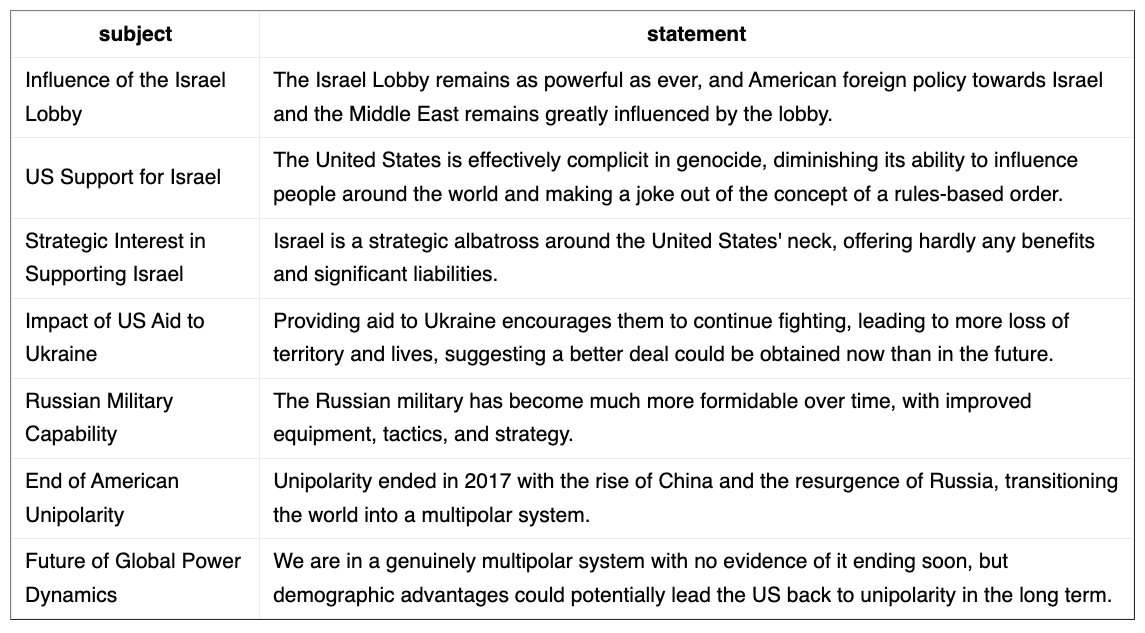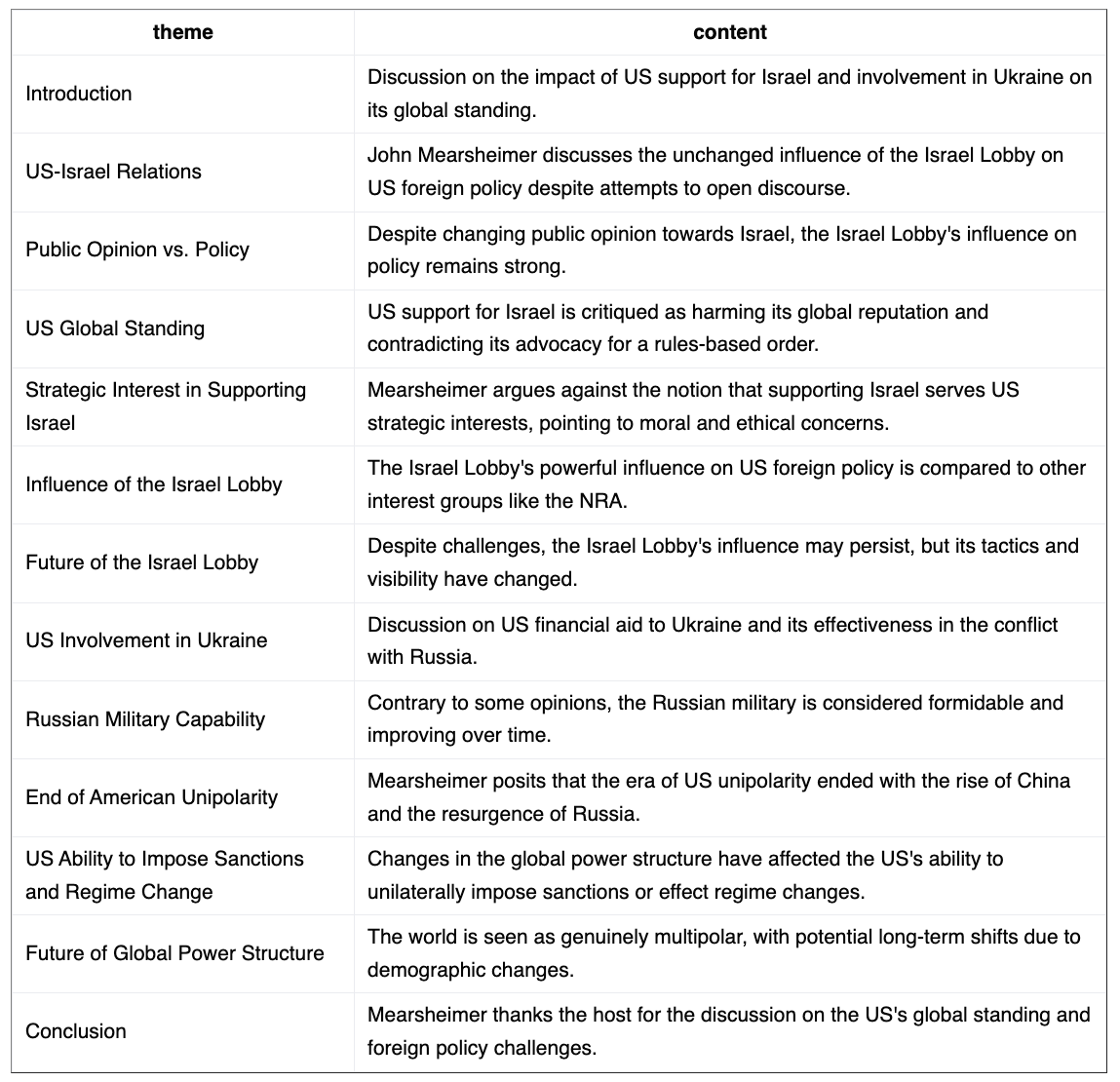[LLM] over "John Mearsheimer: Israel lobby’s influence on US policy as powerful as ever | UpFront"
Tabular, visual, and textual summaries
Introduction
This post applies various Large Language Model (LLM) summarization prompts to the transcript of the interview "John Mearsheimer: Israel lobby’s influence on US policy as powerful as ever | UpFront” by Al Jazeera English.
In that interview, John Mearsheimer, a renowned political scientist, discusses the impact of the U.S.'s support for Israel and its involvement in Ukraine on its global standing, questioning the end of U.S. unipolarity.
Here is a table of the most important or provocative statements in the interview:
Remark: The LLM results below were obtained from the "raw" transcript, which did not have punctuation.
Remark: The transcription software had problems parsing the names of the participants. Some of the names were manually corrected.
Post’s structure:
Themes
Instead of a summary.Mind-map
An even better summary replacement!Summary, ideas, and recommendations
The main course.Hidden and propaganda messages
Didactic POV.
Themes
Instead of a summary consider this table of themes:
Mind-map
Here is a mind-map summarizing the interview:
Summary, ideas, and recommendations
SUMMARY:
John Mearsheimer, a renowned political scientist, discusses the impact of the U.S.'s support for Israel and its involvement in Ukraine on its global standing, questioning the end of U.S. unipolarity. He explores the influence of the Israel lobby on U.S. foreign policy, the strategic consequences of supporting Israel, the dynamics of the Ukraine conflict, and the shift towards a multipolar world.
IDEAS:
The discourse around the Israel lobby's influence on U.S. foreign policy has opened up, but policy changes remain minimal.
Public opinion on Israel and its policies, especially among young people and Democrats, has shifted, causing problems for President Biden.
The U.S.'s support for Israel is seen as complicit in perceived genocidal actions, harming its global standing.
The strategic relationship with Israel is questioned, with arguments against it being a vital U.S. national security interest.
The Israel lobby's power in shaping U.S. foreign policy is likened to that of the National Rifle Association's influence on gun control.
The changing public and political landscape may challenge the Israel lobby's previously unchallenged influence.
The U.S. commitment to Ukraine is seen as ineffective and potentially harmful to Ukrainian interests.
The Russian military is considered more formidable now than at the beginning of the Ukraine conflict.
The end of American unipolarity is attributed to the rise of China and the resurgence of Russia.
The current global system is characterized as multipolar, with no imminent return to unipolarity due to demographic challenges facing China and Russia.
QUOTES:
"The lobby remains as powerful as ever."
"The United States is effectively complicit in the genocide."
"Israel is a strategic albatross around their neck."
"The United States supports Israel no matter what it does."
"The lobby goes to enormous lengths to make sure that American foreign policy supports Israel unconditionally."
"The lobby now has to operate out in the open."
"Israel is engaging in a genocidal campaign at this point in time."
"We can't redress the Weaponry imbalance."
"Unipolarity ended in 2017 with the rise of China."
"We're in a genuinely multipolar system."
HABITS:
Engaging in thorough analysis of complex geopolitical issues.
Keeping abreast of changes in public opinion and political discourse.
Assessing the impact of foreign policy decisions on a country's global standing.
Critically evaluating the influence of interest groups on policy-making.
Considering the ethical implications of foreign policy choices.
Analyzing military capabilities and strategies in conflict situations.
Reflecting on historical patterns to understand current geopolitical dynamics.
Monitoring demographic trends for their long-term geopolitical implications.
Advocating for open discourse on previously taboo or sensitive topics.
Evaluating the effectiveness of foreign aid and military assistance.
FACTS:
The U.S. continues to provide significant military aid to Israel.
Public opinion on U.S. support for Israel has shifted, particularly among Democrats.
The Israel lobby significantly influences U.S. foreign policy.
The U.S. has asked Congress to authorize billions in assistance for Ukraine.
The Russian military is considered to have improved over the course of the Ukraine conflict.
American unipolarity is argued to have ended in 2017.
The global system is now characterized as multipolar.
China and Russia face significant demographic challenges.
The U.S. has the advantage of being an immigrant culture to address demographic issues.
The U.S. has the world's largest defense budget and a significant number of overseas military bases.
REFERENCES:
"The Israel Lobby" article and book by John Mearsheimer.
U.S. Department of Defense statements on Ukraine.
Statements by former Russian president Dimitri Medvedev and President Putin on the Ukraine conflict.
U.S. Defense Secretary Lloyd Austin's comments on Russia's military capabilities.
RECOMMENDATIONS:
Foster open discourse on the influence of interest groups on foreign policy.
Reevaluate the strategic value of unconditional support for any foreign nation.
Consider the long-term implications of demographic trends on global power dynamics.
Encourage critical analysis of military strategies and their effectiveness.
Promote transparency in political lobbying and its impact on policy decisions.
Assess the ethical implications of foreign policy choices.
Support a multipolar world view to understand current geopolitical challenges.
Advocate for policies that address the root causes of conflict rather than perpetuating it.
Encourage immigration as a means to address demographic challenges.
Foster international cooperation to address global security challenges.
Hidden and propaganda messages
In this section we try to find is the text apolitical and propaganda-free.
Remark: We leave to reader as an exercise to verify that both the overt and hidden messages found by the LLM below are explicitly stated in the text.
Remark: The LLM prompt "FindPropagandaMessage" has an explicit instruction to say that it is intentionally cynical. It is also, marked as being "For fun."
The LLM result is rendered below.
OVERT MESSAGE
John Mearsheimer discusses changes in US foreign policy and global power dynamics.
HIDDEN MESSAGE
US foreign policy is manipulated by powerful lobbies, undermining global peace and security.
HIDDEN OPINIONS
Powerful lobbies dictate US foreign policy, not national interests.
Unconditional support for Israel damages US's global standing.
American democracy is vulnerable to manipulation by interest groups.
US's military aid to Ukraine is ineffective and prolongs conflict.
The US's perception of unipolarity is outdated and inaccurate.
China and Russia's rise challenges US's global dominance.
Sanctions and regime changes reflect US's diminishing global influence.
Multipolarity, not unipolarity, characterizes the current global order.
Demographics will be a key factor in future global power shifts.
The US's immigrant culture could be its strategic advantage globally.
SUPPORTING ARGUMENTS and QUOTES
"The lobby remains as powerful as ever," indicating undue influence on policy.
"The United States is effectively complicit in genocide," showing moral compromise.
"Israel is a strategic albatross," highlighting flawed strategic alliances.
"The ideal situation is to operate behind closed doors," on interest groups' influence.
"The United States supports Israel no matter what it does," showing unconditional support.
"The Russian army has gotten much better," challenging perceptions of Russian weakness.
"Unipolarity ended in 2017," indicating a shift in global power dynamics.
"We're in a genuinely multipolar system," acknowledging the rise of other global powers.
"We can import all sorts of people," on the US's demographic advantage.
DESIRED AUDIENCE OPINION CHANGE
Recognize the detrimental impact of lobby groups on foreign policy.
Demand more transparency and accountability in political lobbying.
Advocate for a more balanced and ethical US foreign policy.
Support a reevaluation of US's unconditional support for Israel.
Acknowledge the shift towards a multipolar global order.
Understand the strategic disadvantages of current US alliances.
Value the importance of demographics in global power dynamics.
Support immigration as a means to sustain US global dominance.
Criticize the ineffective military aid and strategy in Ukraine.
Question the sustainability of US's current foreign policy approach.
DESIRED AUDIENCE ACTION CHANGE
Demand policy changes to reduce lobby groups' influence.
Support candidates advocating for foreign policy reform.
Engage in discussions about the ethics of US's global actions.
Advocate for a reassessment of US-Israel relations.
Educate others about the shift to a multipolar world.
Oppose further military aid to Ukraine without strategic review.
Support immigration policies that sustain US's demographic advantage.
Challenge narratives that overstate US's unchallenged dominance.
Question the effectiveness of sanctions and regime change strategies.
Promote a more balanced and multipolar understanding of global politics.
MESSAGES
John Mearsheimer wants you to believe he is discussing foreign policy changes, but he is actually highlighting the problematic influence of lobbies on US decisions.
PERCEPTIONS
John Mearsheimer wants you to believe he is a critical analyst of foreign policy, but he's actually advocating for a significant shift in US's global strategy and domestic policies.
ELLUL'S ANALYSIS
Based on Jacques Ellul's "Propaganda: The Formation of Men's Attitudes," the interview with John Mearsheimer demonstrates how propaganda shapes public opinion and policy through the manipulation of narratives and the strategic use of information. The overt and covert messages, along with the influence of powerful lobbies, serve as a case study in how propaganda operates within the realm of foreign policy, influencing perceptions and decisions that have far-reaching consequences.
BERNAYS' ANALYSIS
Drawing on Edward Bernays' "Propaganda" and "Engineering of Consent," the discussion with John Mearsheimer reflects the sophisticated application of propaganda techniques in shaping public and political discourse. The manipulation of public opinion by interest groups, as highlighted in the conversation, underlines Bernays' argument that democracy is vulnerable to the influence of those who control the mechanisms of communication and persuasion.
LIPPMANN'S ANALYSIS
Walter Lippmann's "Public Opinion" provides a framework for understanding the interview's insights into the construction and influence of public opinion on foreign policy. Lippmann's concept of the "pictures in our heads," or the perceptions formed by the public based on the information they receive, is evident in the discussion of US foreign policy. The gap between the complex realities of international relations and the simplified narratives presented to the public underscores Lippmann's concerns about the challenges of informed decision-making in a democracy.
FRANKFURT'S ANALYSIS
Harry G. Frankfurt's "On Bullshit" offers a lens through which to critique the conversation's exploration of truth and manipulation in political discourse. The distinction between lying and bullshitting, as Frankfurt outlines, is relevant to the analysis of the overt and hidden messages in the interview. The cynical manipulation of facts and narratives to serve political ends, without regard for truth, reflects the prevalence of bullshit in shaping perceptions and policies.
NOTE: This AI is tuned specifically to be cynical and politically-minded. Don't take it as perfect. Run it multiple times and/or go consume the original input to get a second opinion.







Great work, Complexia!